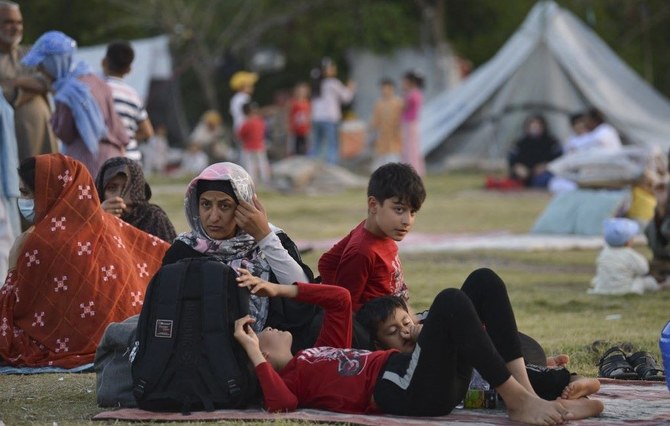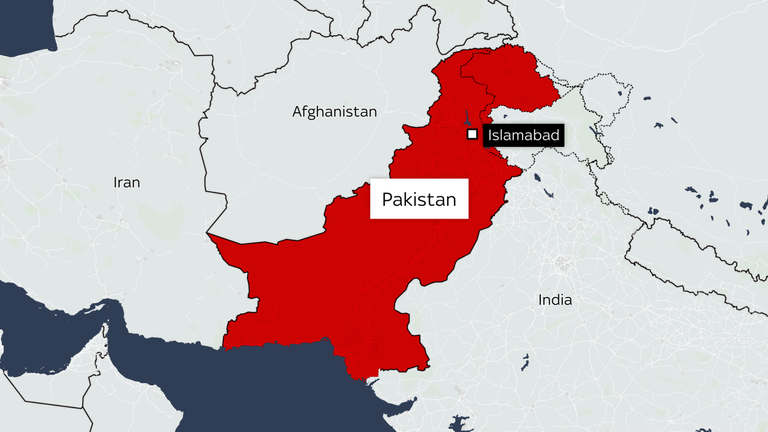Pakistan’s Directive For Nearly 1.7 Million Afghan Asylum Seekers To Get Out Of The Country By November Amid Escalating Tensions And Security Concerns At The Border
Pakistan has issued a directive ordering approximately 1.7 million unauthorized Afghan asylum seekers to leave the country by November. This decision comes against the backdrop of escalating tensions, fueled by a surge in militant attacks along the Pakistan-Afghanistan border. While Pakistan blames Afghanistan-based operatives for these attacks, the Taliban regime in Afghanistan vehemently denies these charges. The directive has sparked discussions about the rights of refugees, international law, and the complex security dynamics in the region.

Pakistan has issued an order for unauthorized Afghan asylum seekers, estimated at 1.7 million people, to leave the country by November.
The decision comes amid increased tensions due to a surge in militant attacks along the Pakistan-Afghanistan border wherein Pakistan has accused Afghanistan-based operatives of carrying out border-crossing attacks, a claim denied by the Taliban regime.
Last week, a blast at a mosque in Mastung city, near the border with Afghanistan, killed at least 50 people during a religious celebration.
The announcement by Pakistan’s Interior Minister Sarfraz Bugti did not explicitly reference recent attacks but emphasized the crackdown on “illegal” Afghan migrants.
As per international law, it recognizes the right to seek refuge in a foreign country, and Pakistan has taken in a substantial number of Afghan refugees, especially after the Taliban regained power in Afghanistan in 2021.

Minister Bugti, without specifying the operation’s details, stated that those without legal status must leave the country by the end of the month, either voluntarily or through forced deportation; he also announced a taskforce to identify and confiscate the assets of “illegal” Afghans.
In response to the order, Afghan officials in Pakistan reported that local authorities had already begun detaining Afghans, regardless of their legal status.
The Balochistan province, near the border with Afghanistan, has frequently been targeted by armed groups such as the Tehrik-e Taliban Pakistan (TTP) and the Islamic State.
Earlier this month, at least 11 people – including a prominent Muslim leader – were injured in an explosion in the same district.
Local state outlet APP reported that Islamabad eventually wanted all Afghans in the country to leave – even those with legal status and Pakistan residence cards. It cited government sources for its report.
Minister Bugti cited 24 suicide bombings along the Pakistan-Afghanistan border since January, with over half attributed to militants operating from Afghanistan.
To address security concerns, Pakistan intends to implement stricter restrictions on Afghans entering the country from November, allowing only those with visas and passports to enter; previously, Afghans often used national identity cards as travel documents, leading to a backlog in documentation requests.

The Escalating Border Dispute
The increased tensions between Pakistan and Afghanistan stem from a recent surge in attacks on Pakistani security forces that Islamabad attributes to groups based in Afghanistan.
Pakistan had hoped for improved security along its western border after the Taliban’s return to power in Afghanistan in 2021, but attacks have continued to rise.
Gen. Asim Munir warned the Afghan Taliban against providing sanctuary to the TTP, saying the militants have sophisticated weapons and freedom of action across the border.
While both countries have engaged in diplomatic efforts to address the issue, including meetings with US officials, Pakistan has expressed frustration over Afghanistan’s failure to curb the Tehreek-e-Taliban Pakistan (TTP).
Pakistani officials have warned against the use of Afghan territory for attacks against Pakistan and called for a selective approach to address security concerns.

Pakistan and Afghanistan have also been engaging directly despite the tensions, with Islamabad’s special envoy Asif Durrani visiting Kabul last week.
The Afghan Taliban called on Pakistan to “choose peace instead of war” and assured that Kabul will not allow anyone to use its territory against Islamabad.
During a meeting with Durrani, acting Afghan Deputy Prime Minister Maulvi Abdul Kabir said Pakistan is not only a neighbour but also a Muslim brotherly nation, stressing that Kabul desires lasting peace.
“We have seen the bitter experiences of wars. We advise Pakistan to choose peace instead of war,” he told Durrani.
Earlier this month, Suhail Shaheen, a senior Afghan Taliban leader and head of its political office in Qatar, reiterated that they “are committed not to allow anyone to use the soil of Afghanistan against any country, including neighbouring countries.”
“But as regards the internal security of a country, it is their responsibility,” he added.

Pakistan’s Frustration
Syed Abrar Hussain, a former Pakistani ambassador to Afghanistan, said Kabul’s “failure” to stop the TTP has led to “frustration” in Islamabad.
The strong statements made by the army chief and defence minister clearly indicate where things stand; Hussain stated who served as Islamabad’s top diplomat in Kabul from 2013 to 2014.
“The issue of terrorism is a matter of serious concern for Pakistan. There is a perception in Pakistan that the TTP is operating from Afghanistan,” he said.
“With the Taliban coming to power in Kabul two years ago, our people expected that Afghan soil would no longer be used against Pakistan.”
Mahmood Shah, a retired brigadier focusing on Afghan affairs, said Pakistan should adopt a “selective approach” to address its security concerns, including taking advantage of Kabul’s dependence on Islamabad and relying on intelligence-based operations along the porous Afghan border.
“These harsh statements will do nothing. Simultaneously, use of force against Afghanistan will not be a good idea at all,” Shah, an ex-intelligence officer who served as administrator of Pakistan’s former tribal regions from 2003 to 2005, told Anadolu.
Pakistan should instead exploit landlocked Afghanistan’s dependence by blocking some key trade corridors and use other means that can hurt Kabul economically, he said.
He said negotiations would only be possible “once their economic interests are compromised.”

“Use of force doesn’t work against them. But it should not be against all the Afghan Taliban groups. It should be selective and only against those groups that are protecting the TTP,” he added.
Closing the Ghulam Khan border crossing could compel the Taliban’s powerful Haqqani group to stop giving the TTP refuge, said Shah, referring to a border point that connects Pakistan’s North Waziristan region with northeastern Afghanistan.
Pakistan and Afghanistan share 18 crossing points, including Torkham in the northwest and the southwestern Chaman, along a border that stretches over 2,600 kilometers (1,600 miles).
“The Afghan Taliban is a conglomerate of several groups, and only a few of them, including the Haqqani network, support the TTP,” he said.
“The largest group is Kandhari (from Kandahar), which favors Pakistan,” he added, emphasizing that Islamabad should isolate and act only against pro-TTP groups.

What happened to peace talks with TTP?
Shah held Pakistan partially responsible for the recent uptick in terrorist attacks in the country.
“Islamabad’s undue expectations from the Afghan Taliban, slowing down of intelligence-based operations over the past one-and-a-half year, and the so-called peace talks have provided an opportunity to the TTP to regroup inside Pakistan,” he argued.
Since 2007, Islamabad and the TTP have held several rounds of dialogue that yielded no results, with both sides blaming each other for the stalemate.
Successive Pakistani military operations since 2014 pushed the TTP toward Afghanistan, bringing about a significant decline in bombings and suicide attacks in the country until 2021.
“Peace talks with the TTP, in my opinion, always had very little chance of success because their (TTP) demands are unreasonably high, ranging from a general amnesty to implementation of their self-styled sharia (Islamic) laws in the tribal regions, and permission for them to return to their hometowns and keep their weapons,” said Shah.
“It’s high time to accelerate intelligence-based operations, revamp the intelligence network along the Afghanistan border, and use a selective approach toward the Afghan Taliban to dismantle the TTP once again.
The Last Bit, The directive issued by Pakistan to have unauthorized Afghan asylum seekers leave the country by November, has stressed Pakistan’s concerns about border security and the surge in militant attacks along its western border with Afghanistan have resulted in this directive, which affects a significant portion of the Afghan refugee population in the country.




